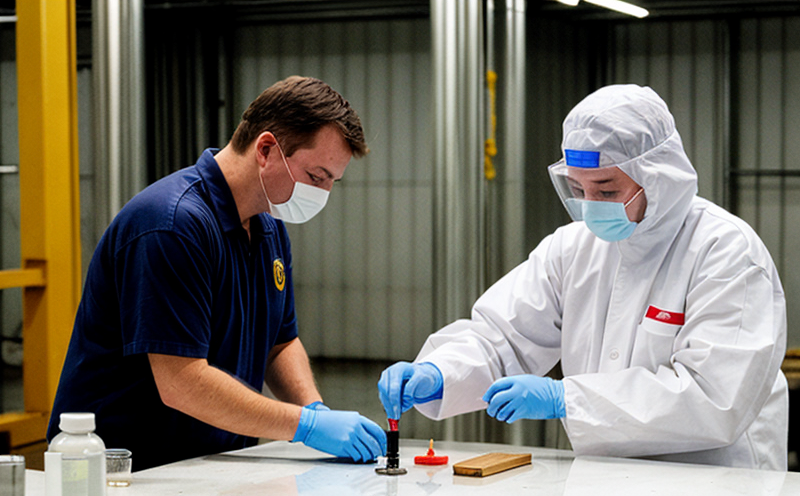ASTM D7386-20 Combined Thermal and Mechanical Stress
The ASTM D7386-20 Combined Thermal and Mechanical Stress test is a critical procedure used in the packaging industry to evaluate materials under conditions that simulate real-world environmental stresses. This test is essential for ensuring that packaging materials maintain their integrity, strength, and functionality over time, especially when exposed to varying temperatures and mechanical forces.
The test is particularly relevant in sectors such as food & beverage, pharmaceuticals, and consumer goods where the protection of products from damage during transportation and storage is paramount. By subjecting specimens to controlled thermal and mechanical stresses, this test provides insights into how packaging materials perform under conditions that mimic actual operational environments.
The combined thermal and mechanical stress test is conducted by first heating a specimen to a specified temperature for a given duration, followed by applying a defined level of mechanical strain while the material remains at the elevated temperature. The goal is to assess whether the material can withstand both thermal expansion and contraction as well as mechanical deformation without failure.
The outcome of this test is crucial for quality managers, compliance officers, R&D engineers, and procurement professionals who are responsible for selecting materials that meet stringent standards and ensure product safety and efficacy. By identifying potential weaknesses in packaging materials early in the development process, this test helps to minimize costly recalls and ensure regulatory compliance.
The ASTM D7386-20 method is widely recognized and used globally due to its robustness and accuracy. It aligns with international standards such as ISO 14995 and EN 13205, making it a preferred choice for companies operating in multiple jurisdictions.
For packaging engineers involved in the design of new products, this test provides invaluable data on material performance under stress conditions. This information can be used to refine designs, optimize manufacturing processes, and improve overall product quality.
| Parameter | Description |
|---|---|
| Test Specimen | A representative sample of the packaging material to be tested. |
| Temperature Range | From -40°C up to 150°C, depending on the test parameters. |
| Mechanical Strain | Defined by the application requirements and can vary from 2% to 30%. Typical values are chosen based on expected field stresses. |
| Test Duration | Varies between a few minutes up to several hours, depending on the specific conditions set for the test. |
| Environmental Chamber | A controlled environment chamber capable of maintaining precise temperature and humidity levels. |
| Mechanical Testing Machine | An apparatus capable of applying controlled mechanical strain to the specimen. |
| Data Collection | Instruments that measure stress, strain, temperature, and any other relevant parameters during testing. |
Scope and Methodology
The ASTM D7386-20 test is designed to evaluate the resistance of packaging materials to combined thermal and mechanical stress. The primary scope involves assessing how well a material can withstand temperature fluctuations alongside mechanical deformation without failing.
Selecting appropriate specimens that represent the intended application.
Controlling the environmental conditions within a chamber capable of simulating real-world temperatures.
Applying defined levels of mechanical strain while maintaining the material at the elevated temperature.
Monitoring and recording all relevant parameters throughout the test duration.
Evaluating the specimen for any signs of failure or degradation after the stress application.
The methodology is closely aligned with international standards such as ISO 14995, which provides additional context on how to conduct similar tests. The test results are typically reported in terms of material properties and performance metrics that can guide further development efforts.
Industry Applications
Food & Beverage: Ensuring the integrity of packaging materials for temperature-sensitive products like dairy, meat, and beverages.
Pharmaceuticals: Protecting medications from heat and mechanical stress during transport and storage.
Consumer Goods: Testing packaging designed to protect electronics or fragile items.
Logistics: Evaluating the durability of shipping containers under extreme conditions.
The ASTM D7386-20 test is particularly useful for industries where product damage due to temperature and mechanical stress can lead to significant financial losses or regulatory issues. It helps manufacturers make informed decisions about material selection and process optimization, ultimately leading to more robust packaging solutions.
Why Choose This Test
Comprehensive: Covers both thermal and mechanical stresses in a single test.
Regulatory Compliance: Ensures adherence to international standards like ASTM D7386, ISO 14995, and EN 13205.
Data-Driven Design: Provides engineers with precise data on material performance under stress conditions.
Cost-Efficient: Identifies potential issues early in the development process, reducing costly rework or failures later on.
Global Recognition: Widely accepted by regulatory bodies and industry stakeholders worldwide.
Accurate Results: High precision instruments ensure reliable and repeatable test outcomes.
The ASTM D7386-20 Combined Thermal and Mechanical Stress test offers a robust approach to evaluating packaging materials, providing valuable insights that can enhance product safety, extend shelf life, and improve overall quality. This makes it an indispensable tool for any organization seeking excellence in material performance testing.





